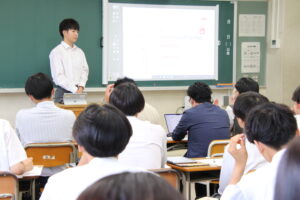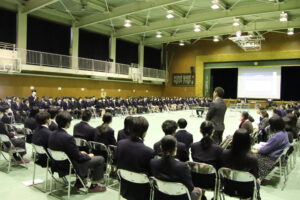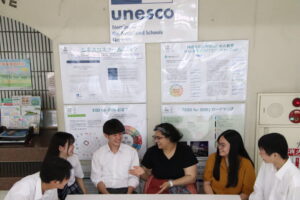-
Tokyo Metropolitan Yamasaki High School
- Level/s of EducationUpper SecondaryRegionKanto
- Main areas of activity
| Location | 1453-1 Yamazakimachi, Machida-shi, Tokyo |
|---|---|
| TEL. | (+81)42-792-2891 |
| Website | https://www.metro.ed.jp/yamasaki-h/ |
| Membership | 2022 |
2024 Annual Report
Biodiversity, Disaster reduction/prevention, Energy, Environment, Cultural diversity, International understanding, Peace, Human rights, Gender equality, Welfare, Poverty
- Our School’s Education Goals
- As a UNESCO affiliated school, we are committed to sustainable educational practices as a basis for promoting ESD (Education for Sustainable Development), to organizing educational activities that raise our confidence in our actions and our self esteem, to fostering in each and every student the ability (knowledge, technical skill, reasoning, discernment, expressiveness, communication skill) to flexibly respond to an ever-changing society, and to developing students who are determined in mind and body to continue to challenge and learn together.
- We put maximum priority on the safety of the students mind and body as well as maintaining order through educational activities, (respect and love) regarding each others human liberties with respect, (collaboration) while cooperating with each other, in order to make each and every student’s hopes and dreams come true, (self-discipline) overcoming our own weaknesses, (aspiration) raising our ambition and cultivating an attitude of facing our own studies, and cultivate autonomous individuals who have manners befitting the age of majority.
Details of Activities
With a whole-school-approach, we are developing educational activities based on our school’s management plan “All Subjects and Courses” in addition to the promotion of ESD for all educational activities. In promoting ESD at our school, we are working on taking a whole-school-approach in both curricular and extracurricular activities. The school is engaged in educational activities with a focus on career education. In curricular activities, the three-year inquiry theme “ESD x Yamasaki Town/Machida” is the focus of “Dedicated Research Time,” which leads to inquiry activities that extend across all subjects, and in extra-curricular activities, the “Student Council” formed by all students together is developed twice a year with activities incorporating the International Day.
Description of Activity “Dedicated Research Time”
1st Years: Exchanges with UNESCO affiliated schools with “Global Perspective” , Exploration of environmental (green, resource, energy) problems which incorporate the international day “World Environment Day”
Second Years: While making good use of global perspectives, narrowing focus to “Yamasaki Machi/Machida” to explore solutions to local issues based on group fieldwork. In December of the 2nd Year, “Yamasaki Summit” is held and results of the research are discussed with the community. (Dedicated Research Time)
Third Years: While looking towards Yamasaki Machi/Machida’s future and “the realization of individual career paths”, International comparative research based on the themes of the 1st and 2nd academic year (Dedicated Research Time)
With the research themes from the 1st/2nd academic year, deepen the research of the future of the community and the realization of individual career paths.
The results of these activities will be transmitted via the school homepage “Yamakou News” or the PR magazine of the Tokyo Metropolitan Board of Education Western Support Center.
Currently (2025/1/8), 157 students, including 2 students at public universities, have decided on their future careers/selected colleges.
- Our school’s “Dedicated Research Time” Structure of Activities
Advice and guidance by external inquiry support staff utilizing the 2024 Exploratory Learning Promotion Project
From the opening of the First Consortium, taking advice and suggestions from consortium meeting members outside the school regarding the school’s “Dedicated Research Time”.
1st Year:
- 10 research groups (5 countries x 2 research themes x 5 classes) are given to 5 homeroom teachers who are put in charge.
- Advice and guidance from Outside Research Assistants (3R Promotion Section, Environmental Policy Division, Environmental Resources Department, Machida City) and UNESCO School ASPUnivNet (Prof. Kobayashi, Faculty of Education, Tamagawa University)
(Experience Activities)
3R Promotion Section, Environmental Policy Division, Environmental Resources Department, Machida City (6 hours, Machida Bioenergy Center)
Online exchange with UNESCO Member Schools (England, Taiwan)
2nd Year:
- 15 teachers in charge of the 15 subcommittees split the entire 2nd year class into 15 research groups
The program is based on the contribution to and understanding of SDG 11, with 15 inquiry groups (around 4 groups with 3 students in each group (collaborative inquiry activities between students and external inquiry support staff and teachers in charge)are developed) working on exploratory activities in breakout sessions
Based on the knowledge and experience gained from their fieldwork, the participants – together with external inquiry support staff – organized and analyzed the information gathered to solve local issues in Yamasaki Machi, and collaboratively prepared and summarized materials for the presentations in November and December.
- Guidance and advice from external inquiry support staff during fieldwork was taken in each inquiry group at the Yamasaki Summit (including the interim presentation), and during daily inquiry activities.
3rd Year:
- 3rd Year Career Events: Participation in the Kanto Block Conference and presentations from representative students
- Focused on individual career realization, Collaborative research with Machida Junior Chamber of Commerce
- July: Cumulative Research Presentations. December: 3rd Year Panel Presentations
- Collaboration with External Parties
Consortium
Machida Junior Chamber of Commerce, Yamasaki Apartments Neighborhood Association, Yamasaki Apartments Meitenkai, Tamagawa University Faculty of Education, Oberlin University, Ichikawa Rice Business, Chronicle, Restable, Showa Kindergarten (UNESCO Candidate School)
1st Year “Humans and Society”
- School-to-school exchanges with foreign schools within UNESCO affiliated schools
(ICS London, in London, England)
- Outside Research Assistant (3R Promotion Section, Environmental Policy Division, Environmental Resources Department, Machida City)
③ ユネスコスクールASPUnivNet(玉川大学 教育学部 小林教授)
- UNESCO ASPUnivNet (Prof. Kobayashi, Faculty of Education, Tamagawa University)
2nd Year “Dedicated Research Time”
- Outside Research Assistant: Showa Kindergarten (UNESCO Candidate School), Machida Junior Chamber of Commerce and Industry, Yamasaki Apartments Neighborhood Association, Yamasaki Apartments Meitenkai, Machida City Hall Environmental Policy Division, Machida City Hall Sports Promotion Division, Urban Renaissance Agency (UR), Chronicle, Oberlin University
3rd Year “Dedicated Research Time”
- Outside Research Assistants, Machida Junior Chamber of Commerce and Industry
-300x225.jpg)




Annual Work Plan
- With a whole-school-approach, we will promote education for sustainable development (ESD) by centering our collaborative learning on curricular activities on “dedicated research time”, and on extra curricular activities such as special activities like “International Day” under the slogan “one student, one leap” that are organized by the student council at least 3 times a year. In addition, with all of our educational activities, we aim to help students realize their individual career paths with 3 years of career education.
- As a UNESCO affiliated school, not only do we have online exchanges with foreign schools that are a part of the global network of UNESCO schools, but we also have online exchanges with UNESCO affiliated schools within the country as well.
2024 Class Schedule (Mainly dedicated research time)
April: Townwork (1st years), Univ Net Lecture from Tamagawa University professor, Consortium
May: Tokyo Global Gateway (1st & 2nd years)
June: Tamagawa University Professor Kobayashi Promotion of ESD Training for Teachers (All faculty), Green Day that occurs in relation to “International Day, World Environment Day” (All Students)
July: Research Plan Presentations (1st & 2nd years), Research Results Presentations (3rd years), 2nd Consortium
August: Fieldwork (2nd & 3rd years)
September: International Day “World Teachers Day” Event (Displayed in Culture Festival)
International Day “Food Waste and Disposal Related Educational ay” event (Culture Festival)
October: Kanto Block Conference (Guidance event), Yamasaki Apartments Halloween Festival & Yamasaki Apartments all schools joint cultural festival begins (1st & 2nd years)
November: Yamasaki Summit Related Interim Presentations (1st & 2nd years), UNESCO School All Japan Conference Participation Planned, 3rd Consortium
International Day “World Science Day for Peace and Development” Events
December: 1st year Summary Presentations (1st years), Yamasaki Summit (2nd years), Research Panel Presentations (3rd years), 4th Consortium
International Day “Human Rights Day” Events
January: Participation in Donto-Yaki, International Day “International Day for Education”
February: 5th Consortium
March: Focused Inquiry of the Next Year’s Research Themes Summary Presentations (1st & 2nd Years), Yamasaki Apartments Caravan Plan
No related reports available in English.
